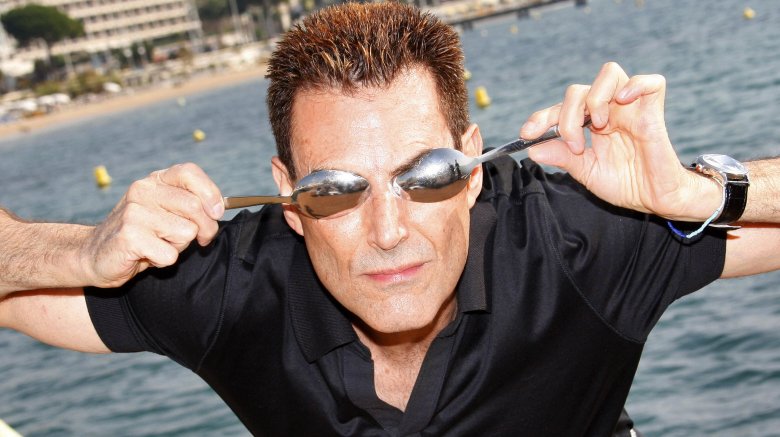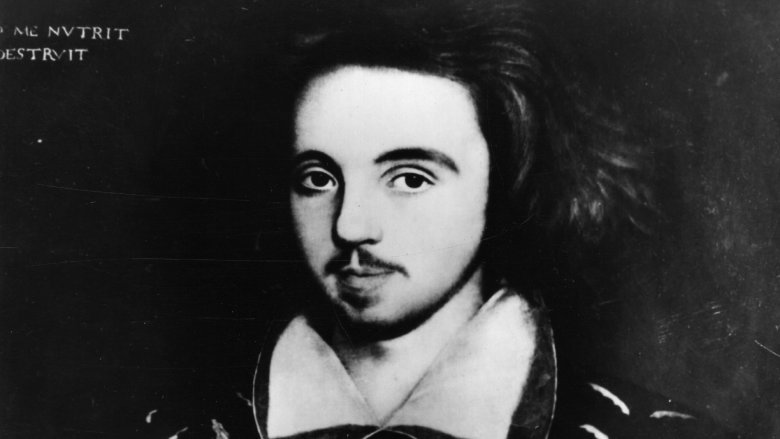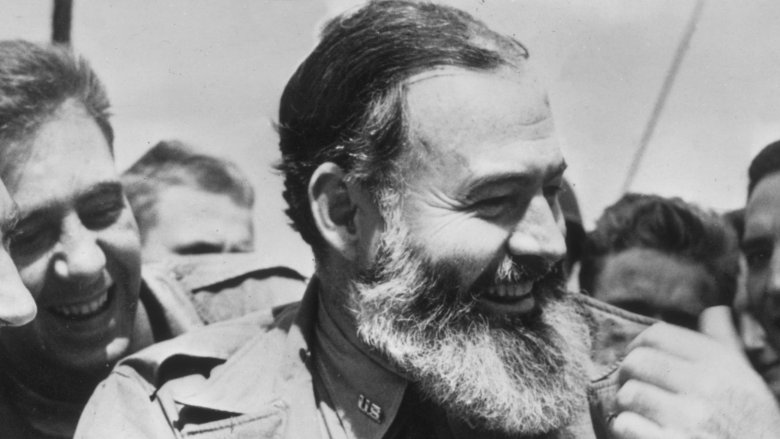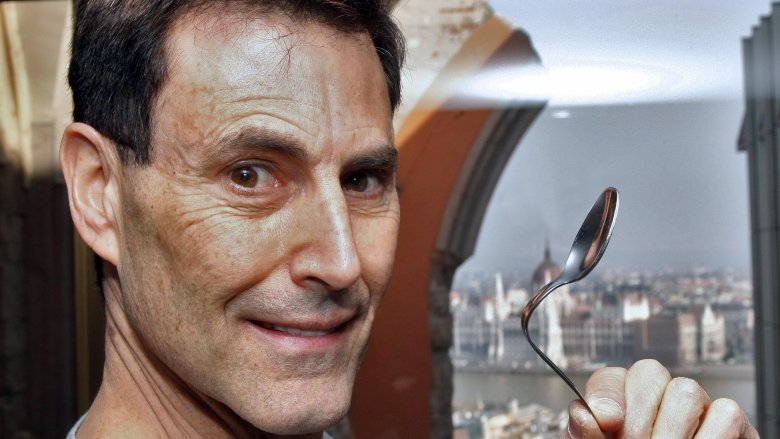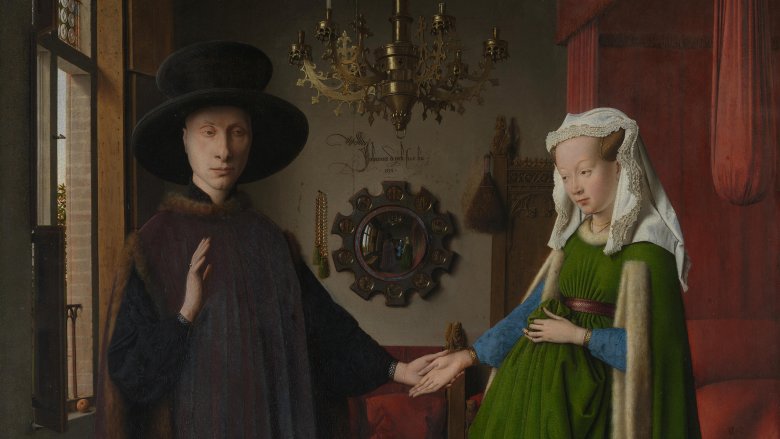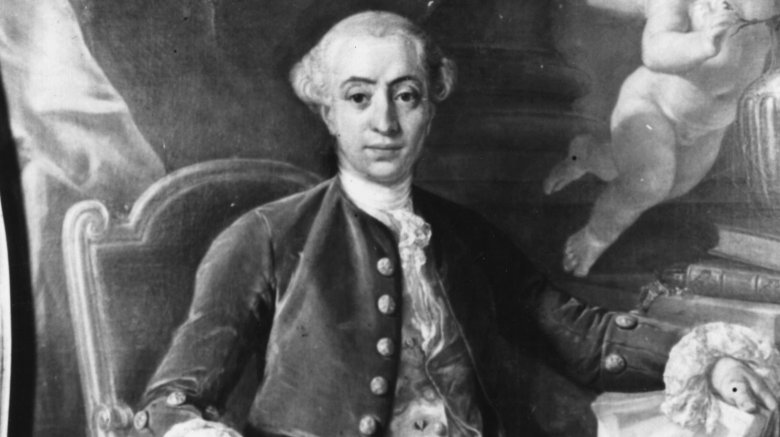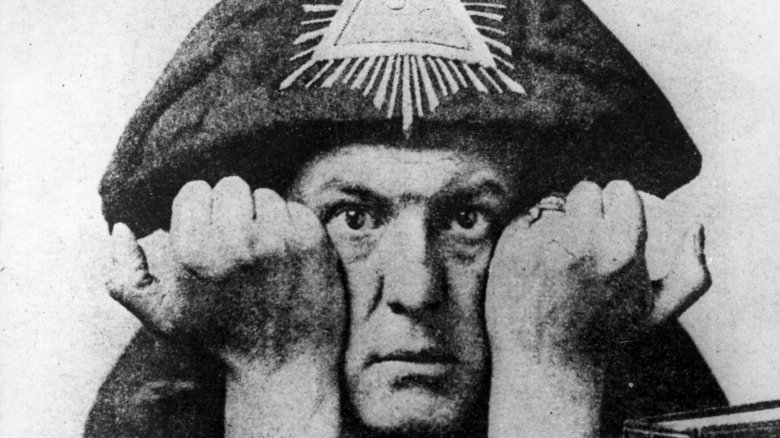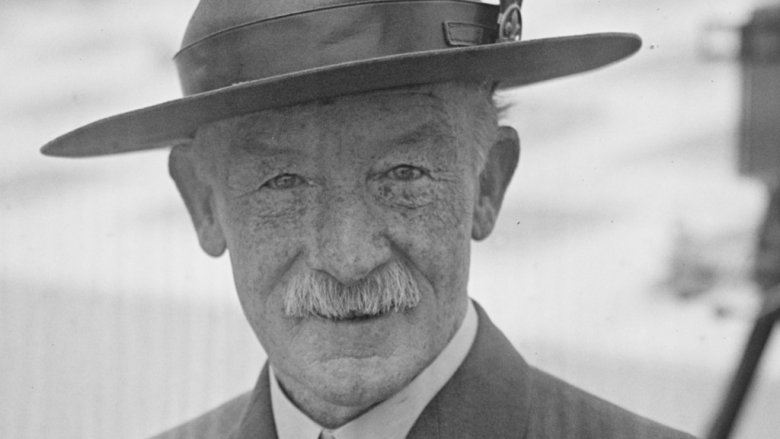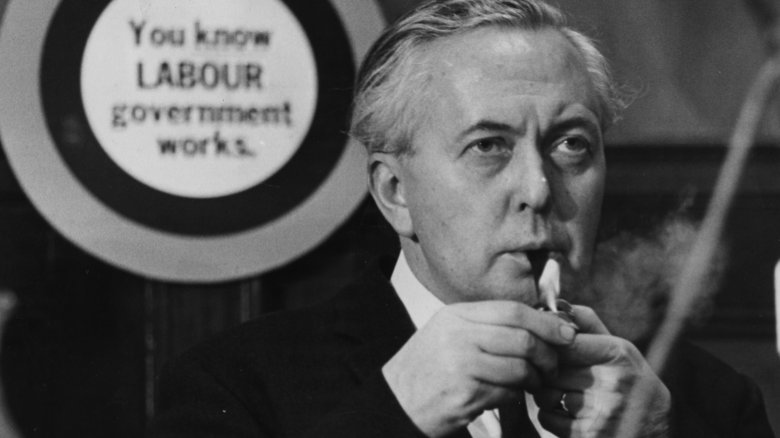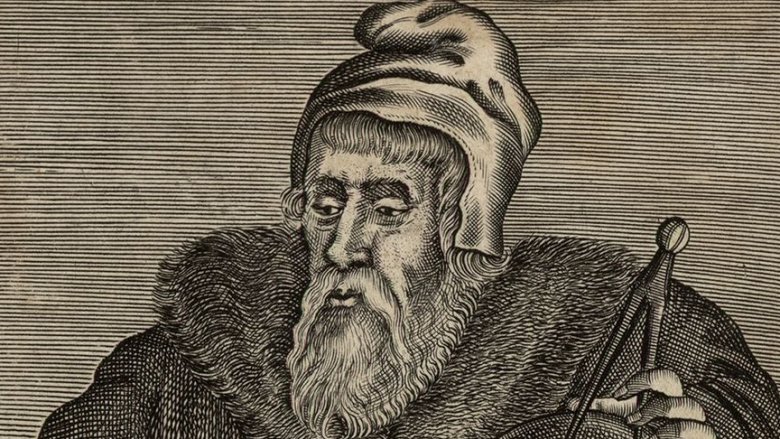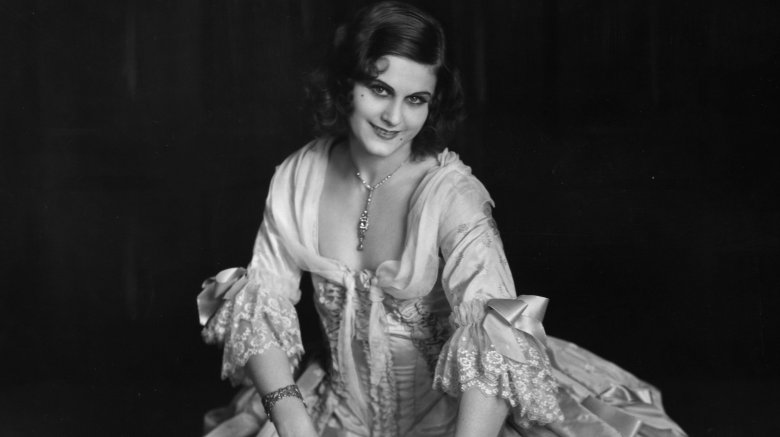Famous People Who May Have Secretly Been Spies
The defining feature of being a spy is that people don't know you are one. That's both why a real life explosion-magnet like James Bond would be useless for the purposes of spycraft, and why there are so few historical figures we can say with 100 percent certainty were in the espionage game. Good spies tend not to leave a trace. Bad ones tend to end up with a terminal case of death.
Not that a lack of conclusive evidence has stopped rumors from surfacing. Over the years, many historical and contemporary icons have been fingered as possible spies. But only a handful of these theories have had enough proof to swing the plausibility-o-meter from a firm, red "no way" to a tentative, amber "you know what? They really might be." We're not saying any of the following definitely spent their spare time lurking in the shadows with the George Smileys of yesteryear. We're just saying there's a tantalizingly good chance that they did.
Christopher Marlowe
If you were recasting Elizabethan England as a 1980s high school movie, Shakespeare would be the stuffy bookworm, while Christopher Marlowe would be young Christian Slater at his hellraising best. The ridiculously good-looking playwright was a hard drinking, hard fighting provocateur who flaunted his atheism and homosexuality at a time when both of those things could get you killed (and, in Marlowe's case, possibly did).
By the time he was murdered at the age of 29, he'd taught Shakespeare the art of tragedy, written some of the greatest plays in the English language, and been in actual street fights more times than you've played Street Fighter II.
Oh, and — according to the Michigan Quarterly Review — he may have also found time to become Queen Elizabeth I's personal spy.
Marlowe got away with some truly outrageous stuff in his lifetime. He and his poet friend Thomas Watson once murdered an innkeeper's son (via The Telegraph). He was arrested in the Netherlands for counterfeiting coins. He vanished from Cambridge University for 32 weeks, then demanded his Master of Arts degree when he returned. In each of these incidents, Elizabeth's Privy Council stepped in to bail Marlowe out, pay his fines, or force Cambridge to award his MA.
Since Marlowe was the common son of a shoemaker, the smart money says the Crown was bailing out an intelligence asset. Either that, or Elizabethan England put upholding the rule of law a very distant second to the value of high quality stage drama.
Ernest Hemingway
Ernest "Papa" Hemingway was the manliest writer who ever picked up a pen. His entire life seemed dedicated to pursuing macho activities like fishing, hunting, shooting, sailing, and growing a beard so thick and bushy it could stand on its own as a monument to testosterone. So it should come as no surprise that a manly activity like spying was on his CV. However, it might come as a surprise to learn just who Papa was doing that spying for. According to ex-CIA spook Nicholas Reynolds (via the Independent), the greatest 20th Century American author may have been in the pay of Stalin's Russia.
In his book, Writer, Sailor, Soldier, Spy: Ernest Hemingway's Secret Adventures, 1935-1961 Reynolds claimed that he referred to "a classified KGB file smuggled out of Moscow." That document supposedly said that Papa was recruited in 1940 by the NKVD, the forerunner of the KGB. Given the code name "Argo," Hemingway was allegedly tasked with passing on political information to the Soviets. Apparently, the document says that no hard information actually made its way into Russian hands, which suggests either Hemingway quickly came to regret the decision, or was just a really lousy spy.
Interestingly, the NKVD wasn't the only agency Hemingway had supposedly signed up with. Reynolds also uncovered evidence the writer had worked for the Office of Strategic Services (OSS), the 1940s version of the CIA. Hemingway's biographer, in an interview with History.com, speculated that this dual allegiance could have been the cause of his eventual suicide in 1961.
Uri Geller
Mossad, Israel's spy agency, is one of the best-funded, most-feared intelligence services on the planet. Uri Geller is a flamboyant celebrity who bends spoons with his mind. It's hard to see what the two could possibly offer one another (except for a whole lot of bendy spoons), but that hasn't stopped rumors from surfacing. In a 2013 documentary (recounted here in the Independent) the BBC claimed Mossad and the CIA had been using Geller as a "psychic spy" for decades.
By his own account, Geller was directly involved in the Israeli bombing of a nuclear facility in Iraq, and the freeing of over 100 hostages at Entebbe Airport in 1976. He also claims to have used his mind to erase floppy disks the Russians were smuggling out of Mexico, force someone into signing a nuclear deal that would benefit America, and, at the CIA's instigation, to try and kill a pig using just his mind. That's not some sorta slang, that's a real, actual pig, which Geller thinks was meant to be a tester for remotely killing Soviet officials.
The obvious conclusion is that Geller is making all of this up. As a dude famous for fooling people into believing he has psychic powers, serving up self-promoting bull is kind of his job description. On the other hand, Federal documents declassified in 2017, sourced here via the Telegraph, show the CIA spent at least eight days in 1973 testing Geller's psychic abilities, and came to the conclusion that his crazy claims were the real deal.
Jan van Eyck
Flemish painter Jan van Eyck may not have invented oil painting, as is commonly supposed, but he was certainly the first artist to put it to such good use. His portraits are revered today for their photo-realistic style, created when masters like Da Vinci and Michelangelo were still mere gleams in their fathers' eyes. However, Van Eyck's patron, Philip the Good, didn't just hire the leading light of the Northern Renaissance for his abilities with a paintbrush. He hired him for his talents as a secret agent.
In his book Stealing the Mystic Lamb, Art Historian Noah Charney recounts the evidence for Van Eyck's second career as a spymaster. While nothing conclusive comes to light, there are some traces in court records that almost seem to scream "SPY!" For one, vast sums of money are noted as being thrown to Van Eyck, usually with a note saying something like "secret" or "special" or "secret items" or "super special secret items for special secret spying" (we may have made that last one up).
If that wasn't enough, there are also records of Van Eyck frequently being sent to visit rival courts, events usually coinciding with huge sums of money being bunged to him. While it's totally possible the painter just had a sweet, no-questions asked expenses account, it seems more likely he was doing Philip the Not-so Good's dirty work for him.
Casanova
The biggest heartthrob of them all, Casanova spent the 18th Century living the kind of life every single teenage boy has dreamed of since time immemorial. Over the course of seven decades, he seduced up to 132 women and a handful of men (although his tally did kinda include his own illegitimate daughter). Around all this he had time to get involved with endless shady get-rich-quick schemes, become imprisoned and escape the Doge's Palace in Venice, introduce the lottery to France, possibly help Mozart write the libretto to Don Giovanni, hang out with Voltaire, and travel the whole of Europe.
In short, his life reads like one great, big gap year adventure. Or, at least, the kind of gap year adventure you like to pretend you had on LiveJournal. The big difference was that when Casanova finally sat down to write his account, people actually wanted to read it. And Casanova didn't pull any punches. He wrote about everything from shacking up with underage girls to his time as a Venetian spy.
The backdrop was Casanova's return to Venice, after many years in exile. The State Inquisitors offered him work as a spy, rooting out heretics in society. Not being in much of a position to refuse, Casanova went along with it for six years, before dramatically terminating his employment by publishing a devastating satire of one of Venice's powerful patricians. Casanova was banished from Venice again, and immediately went back to his old, lecherous ways.
Aleister Crowley
The king of the occult, Aleister Crowley was so devoted to the dark arts that he dubbed himself the Great Beast 666. A better title might have been the Great Beast 007. In his book Secret Agent 666, author Richard Spence examined the evidence that Crowley had met with British super spy Sidney Reilley in New York during World War I. What he uncovered was a mountain of circumstantial evidence that Crowley himself was working for British intelligence.
Known in his native England as "the Wickedest Man in the World," Crowley was famous almost as much for his anti-UK rantings as he was for his deviant sex life and devil worship. He spent the whole of World War I in New York campaigning heartily — for the Germans. He wrote articles comparing the Kaiser to Jesus Christ. He campaigned for American neutrality, publicly declared Irish independence from Britain, and announced he was at war with England.
So why isn't his name as reviled today as, say, Lord Haw Haw's? For that, you can probably thank the rumors that Crowley was secretly a double agent, sent to New York to infiltrate America's pro-German circles and make them look ridiculous.
While researching his book, Spence found evidence that Crowley had met with British agents. He further found that American Military Intelligence believed all along that Crowley was a UK spy. As to why MI6 might hire a dude who thought he personally knew the devil is anyone's guess.
Lord Baden-Powell
Rather than having others claim he was a spy, Lord Robert Baden-Powell — the founder of the Boy Scouts — made the claim about himself. In 1915, he wrote an autobiographical work called My Adventures as a Spy; in this instance, you could judge the book by its cover. Filled with long-winded accounts of Baden-Powell's exploits with military intelligence in the late 19th century, it reads like a cross between a Boy's Own comic from the 1890s and a parody of an Enid Blyton book.
According to the Public Domain Review, Baden-Powell's accounts of spying are so head-slappingly inane as to be almost hilarious. He claimed he would pose as an eccentric butterfly collector, then walk right up to enemy forts and disguise hastily-scrawled ground plans in sketches of butterflies. Shrewd as this might seem to an eight year old, it's not a realistic way to get around inside enemy territory, unless your enemies happen to be imbeciles. Which is why, despite Baden-Powell's claims, many scholars question if he was ever a spy at all.
As the Public Domain Review article points out, Baden-Powell biographer Tim Jeal has publicly noted the lack of overlap between My Adventures as a Spy and Baden-Powell's own diaries. In other words, it seems likely the creator of the Scouts was less a heroic super spy, and more like that guy in a bar who keeps on insisting to pretty girls that he's totally in the CIA.
Harold Wilson
The Prime Minister of Britain from 1964 to 1970 (with a surprise comeback special in 1974), Harold Wilson became leader of the Labour party after its previous incumbent, Hugh Gaitskell, dropped dead in circumstances best described as "mysterious." After Wilson's election, MI5 decided to look into this. As The Telegraph details, their investigation led to Soviet mole Anatoliy Golitsyn, who claimed Gaitskell had been assassinated by the KGB. Why? Because Harold Wilson was a Soviet spy.
In a 2006 article, The Guardian recounted the conspiracy in all its baffling glory. Along with the CIA, MI5 became convinced Wilson was a Russian mole who had reached the highest office in Britain. After his re-election in 1974, the security services even considered organizing a coup d'etat, so convinced were they they had a spy in their midst. According to the memoirs of former MI5 spook Peter Wright, the agency took it as a given that the left-leaning Wilson was controlled by the Russians.
At this point, we should probably point out that no hard evidence has ever surfaced supporting this. When the KGB files were opened following the Cold War, no one ever found any mention of Wilson as a Soviet asset. And, if he was a Soviet spy, he was probably the suckiest spy there ever was. Wilson's shock resignation in 1976 helped to permanently destabilize the Labour government, leading to the 1979 election of the supremely anti-Soviet Margaret Thatcher. There probably weren't many high-fives in the Kremlin over that one.
John Dee
Alchemist, magician, scientist, traveler... Dr. John Dee was like an Elizabethan Aleister Crowley, Leonardo Da Vinci and James Bond all rolled into one. A pioneering scientist who brought the mathematical signs +,-,x and ÷ to Britain, Dee was an adviser to the Prague court of Rudolph II, and the model for Prospero in Shakespeare's play The Tempest (via Smithsonian mag). Less impressive, but infinitely cooler, he was also the very first 007.
Dee's traveling and court connections made him an ideal asset for intelligence work. It's thought he was recruited to act as a spy for Queen Elizabeth. He certainly had a bromance with her official spymaster, Francis Walsingham, and a level of influence over the royal family that would make Rasputin jealous. But the real kicker comes in the form of the secret letters Dee sent the monarch. Each one was signed off with a pair of "o"s that may have represented spying eyes, and the number 7. In other words: oo7.
That's not to say Dee spent his spare time drinking vodka martinis and sending women wild with his spectacularly chiseled torso. A 2012 press release by his Alma Mater, Cambridge University, is at pains to stress he likely wasn't a spy, though he may still have partly inspired Bond. Cambridge graduate Richard Deacon was a Dee fan, and is thought to have shown the oo7 symbol to his friend Ian Fleming. Fleming liked it so much he stuck it in his first Bond novel.
Marika Rökk
Marika Rökk is both famous and famously controversial in Germany. A native Hungarian, she shot to fame as an actress in Nazi Germany, where she became a darling of Adolf Hitler, and may have been a lover of Joseph Goebbels. Banned from acting for two years after the war ended, she nonetheless managed to shake off her Nazi past to become one of West Germany's biggest stars.
If that seems like a morally dubious career, wait until you hear about the revelations that came in 2017. In February, German newspaper Bild (reported here via The Guardian) revealed that the actress hadn't just been cozying up to the Nazi regime in the '30s and '40s. She'd also been working as a spy for the Soviets.
At any rate, those were the suspicions of the Gehlen Organisation, the West German intelligence services, whose declassified files made the basis of the Bild story. A 1951 report documents suspicions that Rökk was connected to "Russian intelligence posts," although the exact nature of her role is unclear. It's possible that she was working as a Soviet agent the whole time the Nazis were in power, hanging out with Hitler and his pals to gather intelligence on the Nazis. On the other hand, it's also possible that she just enjoyed killing time with genocidal megalomaniacs, whatever their political persuasion.
